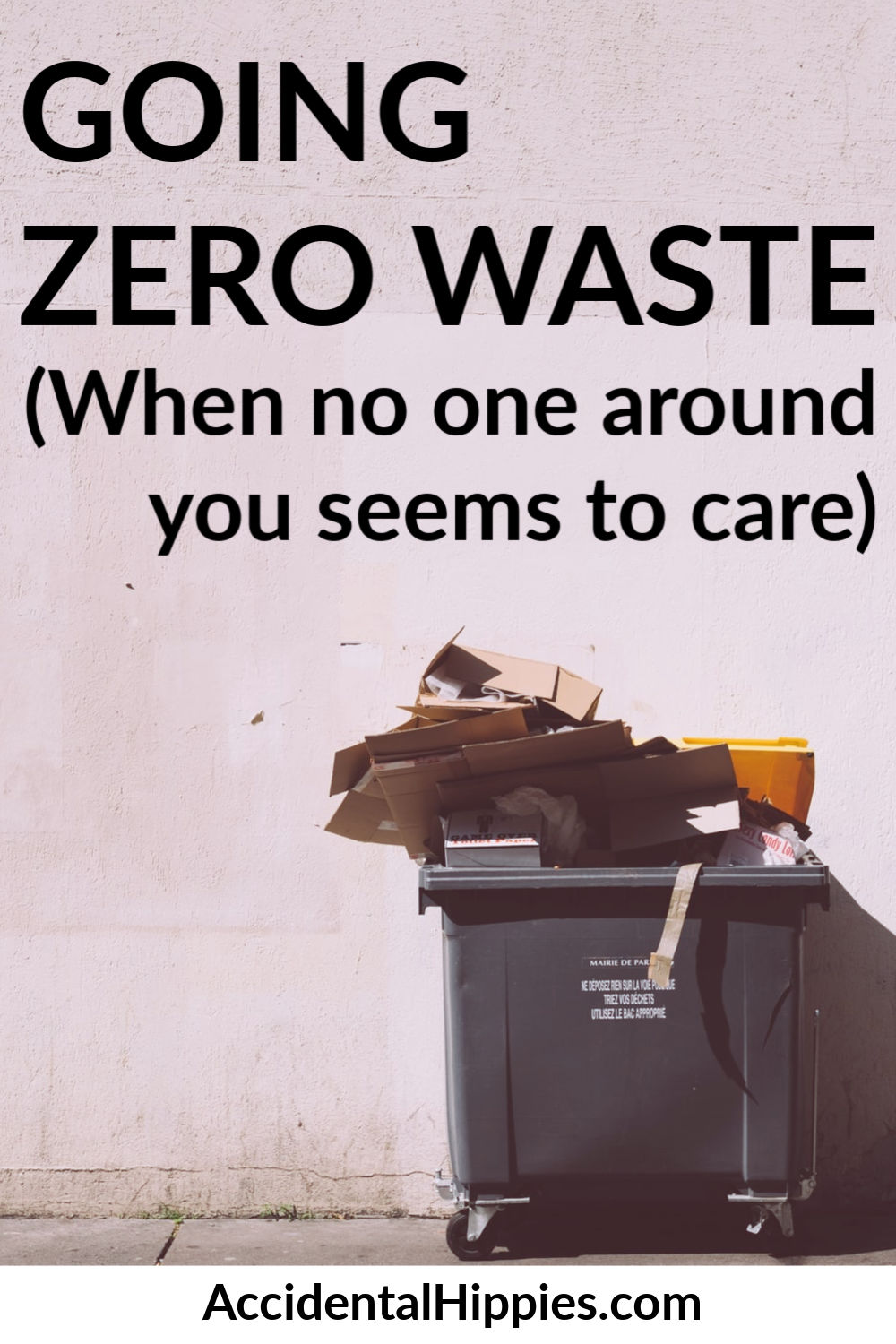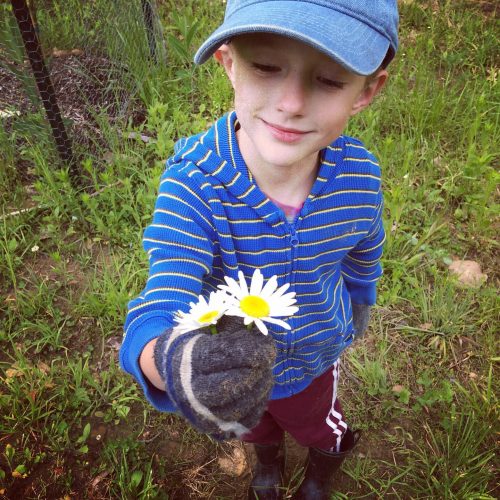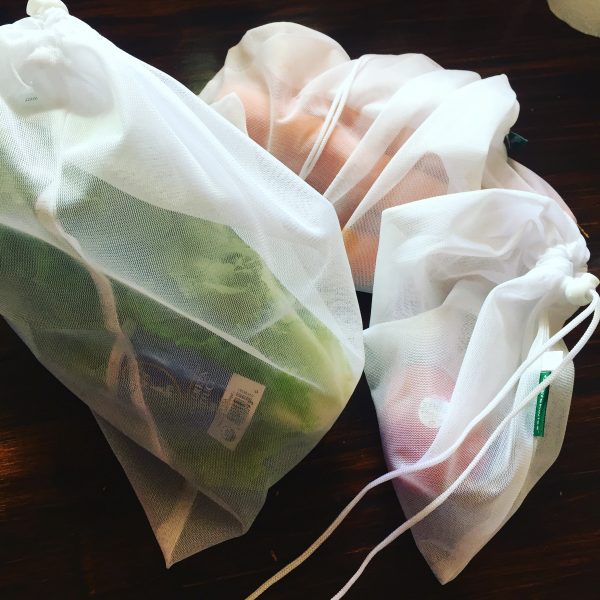Disclosure: I sometimes earn products or commissions from affiliate links or partnerships on my blog. I only recommend products and services I trust to serve you. Learn more.
I recently had a few friends ask variations of this same question: “How do you get your partner on board with being more zero-waste? I feel like I’m fighting an uphill battle because my partner just isn’t on the same page.”
For those of us who fancy ourselves on a journey to zero or minimal waste in our daily lives, it might seem like reusable shopping bags and travel mugs are ubiquitous. But it’s easy to forget that not everyone has made those same kinds of habits a priority. It’s even harder when you’re living or working together and you can’t get on the same page! So what do you do?
I feel pretty lucky because my husband and I both value making choices that are ecologically sound. We tend to avoid single-use plastics, reduce the amount of “things” we buy, opt for reusables whenever it makes sense, buy secondhand, and live by the creed of “use it up, wear it out, make do or do without”.
So while I can’t say that my spouse and I have been at odds over living sustainably, I can say that I have had many people who are close to me not be onboard. Here are my biggest takeaways from interacting with them.
How to Go Zero-Waste (when no one around you cares)
1. Lead by example.
This is by far the most important thing you can do to start making changes in the people around you. Think for a moment about someone you know who is constantly harping on the right way to do things. They’re pushy and stubborn. They alone know the only correct way to do anything.
Don’t you just LOVE when people act like that? NO? You don’t?
That’s exactly how you SHOULDN’T behave when dealing with a spouse, parent, sibling, friend, or coworker on your journey towards zero-waste. I know, because I’ve done it. It’s a psychological turn-off and will leave your loved ones avoiding the very behavior you want them to adopt. Instead?
Walk the walk.
Take your grocery bags with you everywhere. Drink from your travel mug or water bottle. Be the person who keeps a knife, fork, and spoon in your bag in case you eat out and they only have plastic cutlery.
Importantly, do these things without saying a lot. Actions truly do speak louder than words, especially words that reek of smug self-satisfaction. Just be. Just do. Your actions will speak for themselves. HOWEVER, there IS a time for words, which leads me to…
2. Openly and honestly discuss WHY sustainable choices are important to you.
Yes, having honest discussions that don’t devolve into a shouting match can be tricky, but it doesn’t have to be.
Knowing “why” it’s important to you to make more sustainable choices, and being prepared to accept honest and sometimes contrary feedback, is the first step towards making real changes.
For me, my “why” has many parts. I recognize that the Earth has finite resources and I think a lot about the ultimate destination for whatever it is I’m using. Can I recycle it? Could I turn it into something new? Can I simply put it in my compost or let it biodegrade on our land somewhere? What options do I have and where is this thing really going to end up at the conclusion of its useful life?
I want to leave the Earth in better shape than I found it. I think often about the kind of Earth we’ll have when my now six-year-old son is old and withered. Will I have contributed to making it better or making it worse?
Your “why” may be entirely different from mine, and that’s good. There’s no real right or wrong here. And there’s also no perfect solution. Sometimes the things we think are environmentally friendly turn out not to be. I’m pretty far from being a perfect example of eco-friendliness, but I try my best and am happy to have open and honest talks with the folks I love about it. That’s how we can start to make real collective progress.
Also, try not to be a jerk about it. Some of you might read this post and think, “Ugh, but most reusable bags actually have a bigger overall footprint than single-use plastic bags and ooh your to-go cup has plastic on it and metal straws don’t really put a dent in the problem and and and…”
I agree, but just stop it. Really. None of us is perfect at this and I definitely don’t claim to be. What’s important is that we stop to listen to one another and figure out better solutions together. “Better”, not necessarily “perfect”.
Once you’ve done that, the best action you can take to help your spouse, partner, family member, or coworker get onboard is to…
3. Make zero-waste an EASY HABIT.
If you want to get others onboard with zero-waste practices, you must make it EASY to build lasting HABITS. You can do this by using easy items, arranging your space better, and creating systems/routines to support your choices. For example:
Make it “easy” by using simple items.
One example that comes to mind is when we cloth diapered our son. I wanted his caretakers to use cloth too, but it seemed foreign and intimidating to them. We were avid users of prefolds at home, but those can be complicated for newbies. Instead, I bought very easy all-in-one diapers for them to use and taught them how. It took a bit for them to learn, but they all got on the cloth diaper bandwagon because I made it easy (and tried not to be obnoxious about it). I always included a disposable option to be flexible and they would rarely use it.
Other simple items that aren’t too different than their wasteful counterparts might include:
- reusable straws
- cloth napkins and kitchen towels
- real silverware and mugs out and accessible in the breakroom at work (easy to find secondhand)
- reusable Keurig K-Cup
- reusable water bottles and tumblers
There are LOADS of options here. Evaluate your lifestyle and see what easy swaps you can find!
Look at how you can physically arrange your space to create sustainable routines and systems.
For example, I noticed at my mom’s house that she produced a lot of trash in her office that could have gone to the recycle bin. Since the bin was far away from the office, she’d just throw it in the trash can next to her desk. Can’t say I blame her, really. Easy solution: put a recycle bin in the office.
You can also do things like:
- Place cloth napkins in a basket at the center of the table
- Set up automatic subscriptions to eco-friendly goods and services you use regularly, if available
- Put your reusable bags in the part of your car where you’re most likely to see them and take them with you (i.e. don’t just throw them in your trunk if you won’t look there)
- Set sustainable products out in the open at the point of use (i.e. if you want your spouse to use a bamboo toothbrush, set it out in their toothbrush spot unboxed and ready to use)
Related: 13 Totally Normal Everyday Item Swaps to Help You Go Zero-Waste Today
4. Be prepared to do the leg work if something is important to you.
To go along with the previous examples, you can’t reasonably expect someone who is reluctant to try your “weird hippie earth things” to do additional work, at least not at first.
By this list, so far you’re leading by example, having honest discussions, and trying to make it easy for them. But in doing all those things, it bears mentioning that before they’ve bought into the mindset you’ll be doing most or all of the work to make these things happen.
That means that if you want the recycling to go to the drop-off at least once a week, YOU’RE going to have to take it there. If you want to go vegan one day a week, you’re cooking the meals that day. You want to start using a French press instead of a hulking plastic coffeemaker for your morning coffee? You’re the one brewing it. Want to use real cutlery in the office breakroom instead of plastic utensils? Guess who’s washing them! It’s you.
If you’re leading by example, talking about it in a non-judgemental way, and trying to make the process easy, then this phase shouldn’t last forever. It might take some real time for your spouse, family member, friend, or colleagues to start adopting your beloved zero-waste habits, but earnest efforts made in good faith [hopefully] won’t go unnoticed.
5. Play to their values.
I’ve mentioned in a previous post that many of the “weird hippy things” we adopted years ago started because we were trying to be FRUGAL, not eco-aware. We started making our own cleaners, using a reel lawn mower, and cloth diapering because they were great ways to save lots of money. We eventually saw the sustainable sides of those choices. That’s sort of how we became “accidental” hippies.
Maybe your spouse couldn’t care less about marine life getting skewered by coffee straws, but they DO care about saving money. Reusables can help a lot with that.
Or maybe they care about the QUALITY of an item. Again, many reusables are better quality or project a higher STATUS than their disposable counterparts.
Find what your loved ones are actually passionate about and play up that angle. The environmental benefits will dawn on them later, but their related personal values are how you get your foot in the door.
Related: What ARE Accidental Hippies Anyway? (And are YOU one?)
6. Recognize that we’re ALL on the journey and walk WITH them.
As I said, we are far from being picture-perfect examples of eco-friendliness. We each drive a gas 4wd SUV to maneuver our rugged half-mile driveway, we sometimes have to run the gas generator to keep the batteries in our solar-powered home charged enough on cloudy winter days, and my weekly grocery trips still have a fair amount of non-recyclable packaging to them.
But we’re trying. Sometimes, it’s worth taking a step back and reminding myself that, while we’ve made progress, we have a long way to go. Chances are you do too.
Just because I have reusable shopping bags AND produce bags doesn’t somehow make me more “woke” than the other folks at the store with me. It’s a privilege that I even have those bags and get to consider choosing the more expensive food option just because it happens to come with little to no packaging. It wasn’t always that way for us and I understand all too well the struggles of just trying to get food to the table whether it’s wrapped in plastic or not.
Sometimes, I’ll come across articles about things like the unexpected environmental impact of reusable bags versus single-use plastic shopping bags and I have to really stop and think. It’s hard not to clutch your pearls, proclaiming that your reusable cotton bags HAVE to be better. It’s hard to take in new information and figure out where it fits in the grand scheme of things.
But that’s just it. It’s hard and necessary. We all have to share this one planet and the only way we can make actual progress is if we’re willing to do the hard work TOGETHER.
—————
We built an off-grid homestead by hand and are on a quest to live a more sustainable life. Come learn with us!
Click here to learn more about our off-grid cordwood home. Also make sure to follow us on Facebook, Instagram, and Pinterest. And be sure to subscribe below for a free PDF ebook documenting exactly how we managed to make all of this a reality. You also get free access to our Members Only Resource Library!




